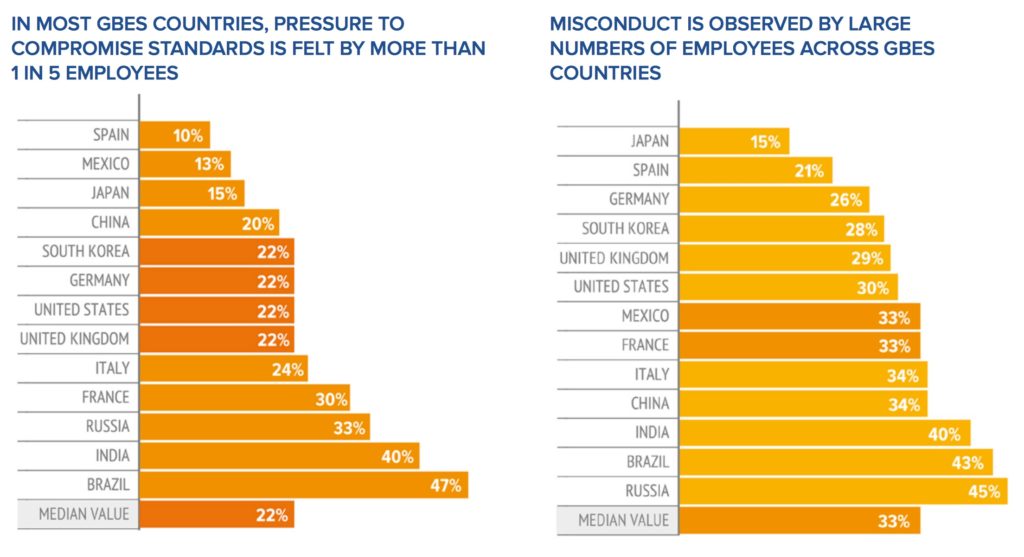Ethical Leadership: The Pathway to Organizational Integrity

Sending a clear message to employees that ethical standards are on the rise improves conduct and behavior.
Photo: Shutterstock
In the last five years, corporate directors in the U.S. and Canada have come down hard on CEOs responsible for ethics infringements in their organizations. During that time, the number of executive officers fired for improper conduct more than doubled, irrespective of who was guilty of the wrongdoing.
The upshot? Boards are becoming less tolerant of corporate misdeeds, with firings soaring by 36 percent in the five-year period ending in 2016 compared to the previous five years.
How Things Stand
A global discussion has begun suggesting that visible ethical leadership is a key weapon in the battle to uphold workplace integrity. In light of the scrutiny boards now face, it is essential for company leadership to become more visible when it comes to ethical conduct.
The Ethics and Compliance Initiative’s latest report, Ethical Leadership Around the World—And Why It Matters, illustrates the critical role executives play in setting the tone for their organizations, and thus, more directors today are recognizing their responsibility to safeguard the ethical culture of their companies. The report covers 13 countries with responses from more than 13,000 employees.
Cultivating a healthy corporate culture requires first and foremost leadership’s understanding of the importance of ethics; employees who believe their supervisors to be ethical are more likely to report observed misconduct without fear of reprisal. The benefits of strong visible leadership are threefold:
- Pressure on employees to compromise standards is reduced
- Rates of observed misconduct are lowered
- Retaliation against whistleblowers declines
More leaders need to be aware of the tone and example they are setting. Sending a clear message to employees that ethical standards are on the rise improves conduct and behavior.
Leading by Example
Given that leadership establishes its credibility on the actions of the individual, it’s incumbent among leaders to set an obvious example and spread the message that good conduct and high standards are an essential part of the organization.
This begins with a proactive management team that establishes anti-retaliation measures. Once problems go unreported in an organization, a negative work atmosphere materializes as a result, essentially promoting misconduct.
One pervasive belief workers harbor is that ethics and compliance guidelines are there for the good of management. They believe the rules and regulations are designed to provide a screen for leadership when the going gets rough. This isn’t as farfetched as it may seem; data shows a troubling tendency for leaders to blame others when things go wrong. Cynicism takes root when employees witness their leaders’ hypocrisy in action, thus accountability becomes a crucial component for the legitimacy of ethical leadership.
Interestingly, our research shows that when leaders talk about ethics without modeling them, it can be worse than staying silent. In times of crisis, employees become hyper-aware of contradictory messages from top management. How leaders respond to a crisis has a serious effect on employees’ beliefs.
A Better Way
Strong ethical management creates a knock-on effect that is felt throughout an organization:
- Keeping valued employees: Confidence that top management will not blame others encourages company loyalty. Employees who believe this are more likely to stay for the long run. A lack of strong leadership erodes workers’ engagement and desire to stick with the organization.
- Reducing ethics and compliance risk: Research has shown that ethical leadership is vital in driving down ethics and compliance risk. The ECI’s Global Business Ethics Survey confirms this, providing another reminder of the value of ethical leadership and a call to action for boards to promote workplace integrity.
Fostering a robust ethical culture is crucial for business success. The biggest bonus of a strong commitment to ethical leadership is a noteworthy decline in ethics and compliance risks faced by an organization.
The Damage of Wrongdoing
The bottom line is that the expense incurred by organizational misconduct is far too serious to be taken lightly; stock value suffers significantly in the two years around a CEO’s discharge (which takes place before the cost of the severance payout is considered) as does the corporate name, which can last as long as five years. Additionally, sentiment toward corporate misconduct is at an all-time low, signaling that organizations must prioritize ethics if they are resolute in their long-term success.
Today’s corporate environment comes complete with demanding shareholders and new penalties for wrongdoing. Misdeeds are harder to hide as technology develops systems that track and reveal transgressions. Then there is social media with its extraordinary reach, giving a place for the public to voice its indignation.
The fallout from recent ethical lapses echoes the public opinion that misdeeds can’t continue to go unpunished. Reputational crisis, a strong chance of discovery, and changing attitudes should result in a greater commitment to higher standards.
The pathway forward lies in the hands of leadership for every organization: If they lead with integrity, so will their employees.





